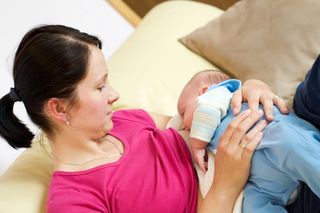
Breast Milk Flavored Lollipops Make Debut

If you want to know what breast milk tastes like, but are prevented by basic human decency from asking the lactating women in your life for a favor, then a candy company in Austin, Texas has got a deal for you: breast milk lollipops.
The lollipops contain no actual breast milk (in fact, they're vegan), but contain a candified version of breast milk's flavor, apparently based on the milk of real mothers who volunteered to help company Lollyphile develop the new product.
"We felt it was our responsibility to find out just what this flavor was that could turn a screaming, furious infant into a placid, contented one," the lollipop product page reads. "Surely the flavor must be heavenly, yes?"
The lollipops will no doubt raise some eyebrows, but other companies have taken breast milk curiosity even further. In London in 2011, an ice cream shop debuted a flavor made with the real deal. Also that year, a graduate student at New York University created an art installation called the Lady Cheese Shop, with cheese made from human breast milk. And in 2010, a Manhattan chef offered a cheese made from his wife's breast milk, though the New York Health Department quickly shut that experiment down.
On the Lollyphile website, curious people can snag a batch of four breast milk-flavored pops for $10, though the price could come down if you act quickly: The code COLOSTRUM at checkout takes 15 percent off your order. Colostrum, of course, is the yellowish-clear "first milk" that feeds newborns in the first days of life.
Follow Stephanie Pappas on Twitter and Google+. Follow us @livescience, Facebook & Google+.
Sign up for the Live Science daily newsletter now
Get the world’s most fascinating discoveries delivered straight to your inbox.

Stephanie Pappas is a contributing writer for Live Science, covering topics ranging from geoscience to archaeology to the human brain and behavior. She was previously a senior writer for Live Science but is now a freelancer based in Denver, Colorado, and regularly contributes to Scientific American and The Monitor, the monthly magazine of the American Psychological Association. Stephanie received a bachelor's degree in psychology from the University of South Carolina and a graduate certificate in science communication from the University of California, Santa Cruz.
